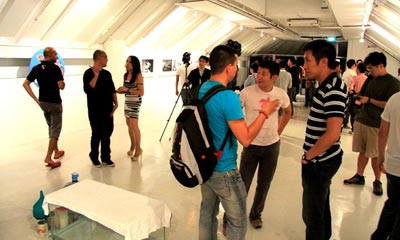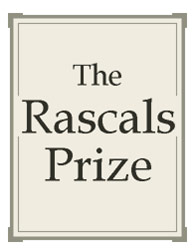Entries are invited for the Rascals Prize 2011. This call was made by gay advocacy group People Like Us at the opening of Indignation 2010, Singapore’s Pride Season, on 1 August. The S$2,000 cash award will be for a piece of research that is related to both (a) gay, lesbian, queer or transgender issues, and (b) Singapore, and the closing date for submissions is 31 January 2011.

Indignation opening event on 1 August 2010.
Indignation, Singapore Pride Season, is running from 1-15 August 2010.
An independent jury (independent from the organisers, People Like Us) comprising four judges will make the decision. They are:
- Dr Brian Bergen-Aurand, Assistant Professor, School of Humanities and Social Sciences, College of Humanities, Arts & Social Sciences, Nanyang Technological University.
- Dr Terence Chong King Shan, Senior Fellow, Coordinator of Regional Social and Cultural Studies Programme, Institute of Southeast Asian Studies.
- Dr Lai Ah Eng, Senior Research Fellow, Asia Research Institute, National University of Singapore.
- Dr Lo Mun Hou, Assistant Professor, University Scholars Programme, National University of Singapore.
(The judges are doing so on a voluntary basis in their personal capacity. Although their work places are mentioned above, this is for information only.)
The brief states that the jury shall look for academic qualities such as data collection, analysis, theory-building and social relevance. They also have the discretion of splitting the prize between two equally deserving works, in which case each joint winner will be awarded S$1,000. If they consider none of the entries to be of sufficient merit, they can also choose not to award the prize.

There are no restrictions with regard to nationality or sexual orientation. That is to say, you don’t have to be Singaporean and you don’t have to be gay to submit an entry.
This round will be the second time this prize will be awarded. The last call was made in August 2008 and the prize was awarded during Indignation 2009. That year, the prize was split between two winners: Phil Chan, then a Ph.D candidate in law and Audrey Yue, a lecturer with the University of Melbourne’s Cinema and Cultural Studies Program.
The judges also decided to give Special Mention Awards to two other entries, one from Pow Jun Kai and the other from a group of secondary school students.
Pow Jun Kai, a Singaporean from King’s College, London, submitted Living Everyday, A New Way of Being Gay: A Foucauldian Project on the Embodiment of Gay Spaces in Singapore in which he argued that
"a majority of gay men and women in the world today retain [an] immaturity, with respect to their use of reason in both private and public spheres. Not only do they succumb to their bodily ‘gay desires’, but they also lack the ‘will to reason’ for the behaviour and mentality that they pride themselves upon. . . . This incapacity to attain knowledge, power and ethics results in the inaptitude to contest against the oppressive structures (such as the state, the military and the church), which eventually cause them to be subjected to those modes of power."
along the way to proposing a new way of being gay.
As the above excerpt suggests, however, the entries are judged for academic merit, not whether they are gay rights-supportive or gay-critical.
A second Special Mention Award was offered to the group of secondary school students. The judges felt that it wasn’t fair to judge their work against seasoned academics, given their tender ages. Nonetheless, seeing the quality of the work which had grown out of a school project and given the fact that they were only in their teens, they felt the group should be commended. Unfortunately, the terms of the Rascals Prize include the stipulation that winners must agree to be publicly-named. No doubt, they understood those terms when they submitted their entry, but in the second quarter of 2009, there was much controversy over sexuality education (also known as the Aware saga) , and People Like Us decided to ask them whether, in the light of the new sensitivity, they and their teacher could afford to be publicly named. They decided against it and chose to forgo the Special Mention award.
I thought it was a great pity. This is what homophobia, especially a state-supported one, does. It delegitimises areas of enquiry, and puts such practitioners of enquiry at risk. Minds are preferred closed; there’s a personal price to pay for keeping them open. The Thio Su Mien-fanned homophobia of 2009 cost these bright kids and their teacher their chance of recognition and acclaim for good work.
Audrey Yue was the joint winner on account of both her submissions, (a) Hawking in the creative city: Rice Rhapsody, sexuality and the cultural politics of New Asia in Singapore, and (b) Creative queer Singapore: The illiberal pragmatics of cultural production.
In the latter, Yue, who is also Singaporean, explored
"the contradictions between the continued policing of homosexuality on the one hand, and economically-driven social liberalisation on the other."
She argued that despite maintaining an illiberal position on gay equality, the Singapore state desired the economic lucre from queer creativity.
"Creative industries sell the business of the arts and culture by transforming arts and culture into services and commodities that add value to the economy."
She pointed out that:
"Theatre has the longest history of GLBTIQ representations dating back to the 1980s. It is also the site where politics are explicitly contested, especially through censorship. In spite of these, theatre continues to receive the highest percentage of funding from the National Arts Council, over and above music, visual arts, dance, arts administration and literature."
But she also argued that the gay community too exploited the opportunities opened to them. The explosion of gay digital speech was fuelled by state investment in digital infrastructure, for example. And when the Singapore Film Commission funded its first project with international collaboration, what emerged was Rice Rhapsody, a film about a mother and her gay sons — with everybody out and happy in the end.
Phil Chan’s entry focussed on jurisprudence. In his paper Shared values of Singapore: sexual minority rights as Singaporean value, Chan, from Hong Kong, but based in the National University of Singapore, examined whether and how sexual minority rights, and human rights in general, may be developed within Singapore’s judicial processes. He took note of two limiting facets: court rulings that law in Singapore should be developed “within our four walls” (i.e. avoiding external references), and the government’s repeated stance that our “Asian culture” should inform any discussion of civil rights.
On both counts, he found it ironical that
"Those who oppose sexual minority rights in Singapore do not regard it inherently contradictory to premise their arguments on laws implanted by the United Kingdom during colonial times, self-selected and self-interpreted ‘Asian values’, Confucian ethics, and religious, particularly Christian, concepts simultaneously. Indeed, [Meredith] Weiss has argued that ‘Singapore’s homophobic opposition is now (somewhat perversely) global rather than local: the shrillest condemnation has been not from, for example, Confucian scholars, but from evangelical Christians – and evangelical Christianity is a relatively recent and marginal Western import.’"
Even our prime ministers reference Christian objections:
"Again, one ought to ask, if Singapore is essentially a Confucian polity, why should the National Council of Churches of Singapore that represents Anglican, Methodist, and Presbyterian churches have such influence on governance in Singapore as was apparently reflected in Prime Minister Goh’s speech?"
And as for the “We are Asian” and “We are conservative” mantra, Chan asked:
"Also, must a Singaporean be conservative in order to have his or her view heard and taken note of? What attributes must a Singaporean have in order to be considered conservative? Are the views of a conservative Singaporean always correct?"
The shutting out of external references does our own development of law no favours.
"Constitutional comparativism, provided that it is consistent and principled, has intrinsic values and advantages as a juridical enterprise and engine for thoughtful judicial, and even legislative, decisions with carefully discerned insights and experiences from other jurisdictions. By exploring the constitutional, legal and social developments in other jurisdictions, Singapore courts as well as Parliament of Singapore may be better informed and better positioned to discern for Singapore society whether and how an individual right, such as sexual orientation equality, may be developed in Singapore under the Singapore Constitution as a Singaporean right and a Singaporean value."
The judges’ citation for Phil Chan’s work said:
"Phil Chan’s essay is a thoroughly researched discussion that has important implications for a progressive gay activism. Among other contributions, the essay fruitfully deconstructs the Asian-values and Singapore-School bases of heteronormativity as it is expressed in Singapore’s laws. It does this mainly by identifying contradictions within this position and directing such contradictions against themselves. The result of an interdisciplinary inquiry, the essay engages jurisprudence with post-colonial and cultural studies to present an opening through which Singapore may advance towards being a less bigoted society."
Unfortunately, I don’t seem to have a record of the citation for Audrey Yue’s prize-winning entries.
The judges for the first Rascals Prize (awarded in 2009) were:
- Dr Kenneth Paul Tan, Assistant Professor of Political Science at the Lee Kuan Yew School of Public Policy, NUS. He specializes in Singapore studies and focusing on topics such as democracy, civil society, media, multiculturalism, and meritocracy.
- Dr Sharon Siddique, a partner in a regional research consulting company based in Singapore. Prior to that, she was Deputy Director of the Institute of Southeast Asian Studies where her research interest covers issues of culture, race and religion.
- Associate Professor Quah Sy Ren, Acting Head of the Chinese Division, School of Humanities and Social Science, NTU. An essayist and playwright, he is actively involved in the arts and civil society.
- Professor Michael Hor Yew Meng, NUS Law Faculty, also Chief Editor of the Singapore Journal of Legal Studies. He has written extensively on criminal law in Singapore.
(Again, it should be noted that they volunteered their time to act in their personal capacity and their work reference are for information only.)
All entries must reach the organisers by 31 January 2011. More details about Rascals Prize 2011 can be found here.
The biannual Rascals academic research prize is sponsored by the Fridae Community Development Fund.
Significance of the name
The Rascals Prize commemorates a seminal event in Singapore’s gay history. On the night of 30 May 1993, police officers brusquely interrupted a regular Sunday gay night at a dance club named Rascals, grabbed the microphone and barked at the crowd. All the patrons were made to line up and those without identification were hauled off to the police station for the night.
Such detention exceeded police powers, and the behaviour of the police strongly suggested intent to harass.
In the early 1990s, police raids on gay outlets were not unknown in Singapore. Typically those affected would feel powerless to object. The difference this time was that a group a gay people did not take it submissively. Led by lawyer Wilfred Ong, they organised a petition signed by 22 people to protest the high-handed police behaviour. To their surprise, they received an official apology!
This incident dovetailed with the effort of another group of people who were starting to meet informally to start a gay support movement. The indignation over the raid on Rascals galvanised them into action and thus People Like Us was born. – From People Like Us











 Printable Version
Printable Version











Reader's Comments
Please log in to use this feature.